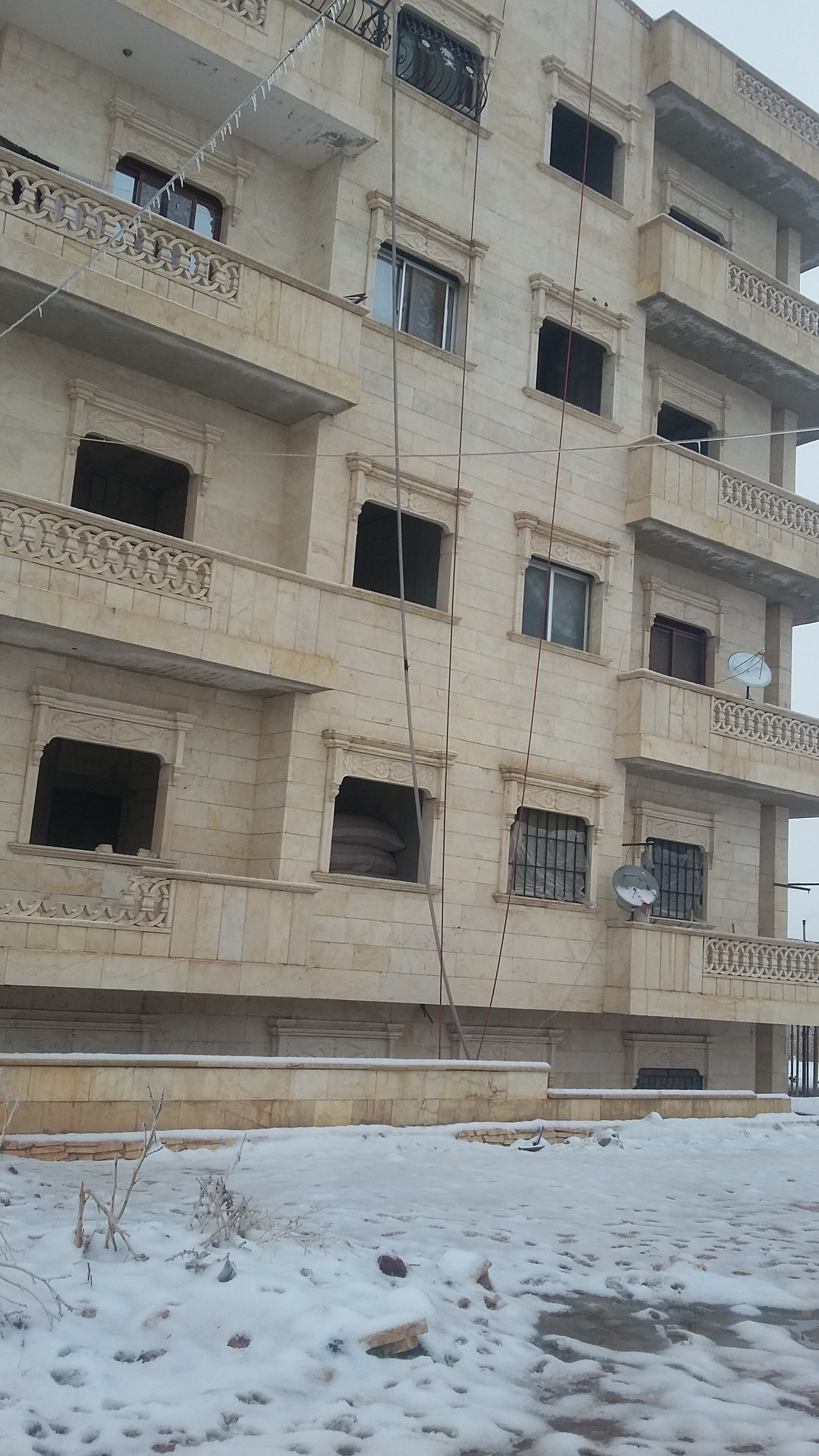Small Investments Reap Big Benefits in Kfar Nabel

Umm Hazem works at a factory processing dried figs in the village of Bsaqla in Idlib’s countryside. The 41 year-old walks to work and back each day, whatever the weather. She has been doing this for over a year and has endured sun, rain and snow.
“The walk to the factory takes me about 40 minutes. Sometimes it can be very tiring, but I’m grateful to have this job which allows me to earn a living and feed my four orphaned children without asking for help from others,” she told Damascus Bureau.
Umm Hazem works with 68 other women at the factory, most of whom are also the family breadwinners due to the absence or death of their husbands.
Owned by local entrepreneur Ahmad al-Saleem, the dried fruit factory is just one of the many small businesses springing up in Kfar Nabel that are giving locals hope for a better future.
Each day the women are divided into three different groups.
The first sort the dried figs according to their size and whether they are light or dark. The second group use small moulds to press the figs into packages of one kilogramme each, and the third group string figs together for sale in the market.
Towards the end of the day, they pack the finished produce into cardboard boxes for delivery.
The women work six days a week, with Friday as a holiday. They are also given the whole month of Ramadan off. Work starts at eight in the morning and ends at two in the afternoon, and each employee earns 700 Syrian pounds a day (three US dollars).
Factory owner al-Saleem says that business is good, despite the ongoing conflict.
“Each season, I visit the owners of local fig tree orchards and buy their dried produce at market price. I collect large quantities of dried figs and store them in my warehouses,” the 48 year-old told Damascus Bureau.
The pressed produce is sent to Latakia seaport, and from there it is exported to Egypt.
According to al-Saleem, export-import agents pay good prices for his goods, so he still makes a profit despite the bribes demanded at government checkpoints to ensure the goods get to Latakia.
While some of Kfar Nabel’s residents have chosen to invest in export, others have invested in importing goods to Idlib and its countryside.
One trader, Wael al-Burghul, imports tea and a herbal infusion called matta from Turkey. He buys both items in bulk cheaply, then repackages them for sale in local markets and shops.
The 35 year-old employs around 75 local workers of varying ages who pack the herbs and tea leaves into small boxes. Workers are paid per box, therefore their daily earnings depend on the amount they finish packing.
Sahir al-Samih is one of these workers. The 18 year-old told Damascus Bureau that given the current circumstances, he was very happy to have found a job.
“I pack about 200 small boxes a day, which earns me a daily wage of 1,400 pounds (six dollars),” he continued.
Sometimes the workers run out of produce, which leaves them with nothing to do for a few days until fresh supplies are imported.

Another area some of Kfar Nabel’s residents have invested in is building and construction.
Mohammad al-Bayush owns a stonemasonry factory, but demand for his work had declined significantly due to the war. Instead of closing down his factory, the 48 year-old decided to divert his business into building housing compounds for the displaced.
Al-Bayush sells or rents out the flats he builds, both making a profit and helping those who have lost their houses.
“I cannot leave my country,” he told Damascus Bureau, “I fled to Turkey at the beginning of the conflict and thought of investing there, but I did not like it so I came home two months later.”
Abed al-Ibrahim is one of 150 builders who work for al-Bayush.
“Despite the high cost of living, my job pays me enough money to provide a decent life for my family,” the 27 year-old said.
Construction site workers earn between 1,500 and 2,000 pounds a day (five or six dollars) and al-Ibrahim has been in work since the beginning of the revolution.
Other residents have invested in the garment trade.
One man, Abu Rashad, who owns a clothes shop in Kfar Nabel, recently opened a sewing and embroidery workshop to supply his shop.
The 45 year-old employs 20 women who each earn 1,000 pounds a day (five dollars).
Sanaa, a seamstress, says she loves her job so much that she barely notices her workday passing by.
“After my husband died, I was left to fend for my three sons whose needs are endless,” the 25 year-old told Damascus Bureau.
Sanaa decided to attend a sewing course at a local women’s centre, which enabled her to get this job.
“This job saved my family. The wages I earn here allow me to support them without having to ask for anyone’s help,” she said.
Sanaa believes that despite the ongoing war, these investment and job opportunities bring hope for a better future.
Hadia Mansour is the pseudonym of a Damascus Bureau contributor from Idlib, Syria.
Read the Arabic version of this article here
